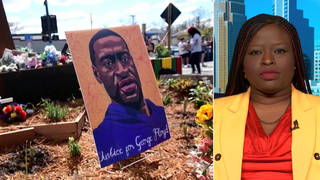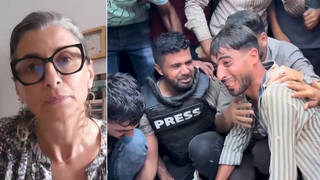
Guests
- Geoff HenleyDallas attorney representing the Timpa family.
In August 2016, 32-year-old Tony Timpa called 911 to ask for help. Timpa had schizophrenia and depression, and was off his medication for schizophrenia. Timpa told the Dallas dispatcher that he was scared. The police responded, and within 20 minutes Timpa was dead. For the past three years, the city of Dallas has fought efforts to release police bodycam footage showing what happened, but the video was finally released this week after a prolonged legal battle. The shocking video contains disturbing footage, with officers arriving on the scene where Timpa was already handcuffed by a private security guard. In the video, Timpa repeatedly pleaded for his life. Police officers mocked Timpa as he died. We speak with Geoff Henley, an attorney representing the Timpa family. “They don’t tend to spend money on the front end to prevent tragedies such as this,” Henley said, referring to the Dallas Police Department. “You have to hit them in the pocketbook to make them change their conduct.”
Transcript
AMY GOODMAN: We begin today’s show looking at the tragic death of Tony Timpa. In August of 2016, the 32-year-old Dallas, Texas, man called 911 for help. During the call, Timpa said he was scared, and told the dispatcher he suffered schizophrenia and depression but was off his medication for schizophrenia. The police responded, and within 20 minutes Tony Timpa was dead.
For the past three years, the city of Dallas has fought efforts to release police bodycam footage showing what happened, but the video was finally released this week after a prolonged legal battle. The shocking video contains disturbing footage. When officers arrived on the scene, they found Timpa was already handcuffed by a private security guard. In the video, Timpa repeatedly pleaded for his life.
TONY TIMPA: Help me!
UNIDENTIFIED: Tony!
POLICE OFFICER: Hey, get on the ground.
TONY TIMPA: No, you’re gonna kill me.
POLICE OFFICER: I’m not gonna kill you.
TONY TIMPA: You’re gonna kill me! You’re gonna kill me!
AMY GOODMAN: The bodycam video shows officers pinning Timpa face-first into to the ground, with one of them jamming a knee into Timpa’s back and pressing down hard. The officers swap handcuffs and zip-tie Timpa’s feet together, as well as rehandcuff him. Timpa is heard pleading, “Will you let me go, please?” After Tony Timpa became unresponsive, the officers stood over his unmoving body, mocking him as though he had fallen asleep.
POLICE OFFICER 1: Wake up!
POLICE OFFICER 2: Haha! I don’t want to go to school, Mom!
POLICE OFFICER 3: Five more minutes, Mom!
POLICE OFFICER 2: Five more minutes, Mom! Haha!
POLICE OFFICER 4: First day. You can’t be late!
POLICE OFFICER 1: Hey, Tony.
POLICE OFFICER 2: We bought you new shoes for the first day of school. Come on.
POLICE OFFICER 4: Made breakfast: scrambled eggs — your favorite.
POLICE OFFICER 2: With waffles.
POLICE OFFICER 4: Waffles.
POLICE OFFICER 2: Rooty-tooty-fruity waffles. I think he’s out cold now.
POLICE OFFICER 1: Yeah, he’s not waking up.
POLICE OFFICER 3: What happened?
POLICE OFFICER 1: I don’t know. He just got quiet.
POLICE OFFICER 2: All of a sudden, he just, bloop, [inaudible].
POLICE OFFICER 1: Oh, there he comes. Sounded like he was snoring.
AMY GOODMAN: The Dallas police officers keep Tony Timpa restrained on the ground. They don’t check to see if he is breathing or even has a pulse.
POLICE OFFICER 1: He’s not dead, is he?
POLICE OFFICER 2: No, he just moved.
POLICE OFFICER 1: Oh, OK.
POLICE OFFICER 2: I think.
POLICE OFFICER 1: OK. He didn’t just die down there, did he?
POLICE OFFICER 2: I don’t think he did.
POLICE OFFICER 1: Is he breathing? Hope I didn’t kill him.
AMY GOODMAN: The video then shows police taking Tony Timpa to an ambulance, where a paramedic declares Timpa dead. The video directly contradicts claims made by the Dallas Police Department defending the officers’ behavior.
We go now to Dallas, where we’re joined by Geoff Henley, lawyer representing the Timpa family.
Thank you so much for joining us before your national news conference that you’re holding today, Geoff. Can you explain what this video — how you got a hold of this video — again, this happened three years ago — and what exactly it shows?
GEOFF HENLEY: Good morning, Amy. Thank you for having me.
Well, this story began three years ago, as you’re indicating. And we actually, our law firm, had sought public information requests, and they were declined. And we eventually filed a writ of mandamus because the city violated the Freedom of Information Act statutes here in Texas. Ultimately, they did produce the video to us, but it was predicated on a confidentiality order. And contemporaneous with that, we had actually filed our federal civil rights lawsuit on behalf of the family as we began to unearth more details.
The video itself has been under wraps since, well, as you’ve indicated, this week, and it was released solely because the criminal actions against the three officers — Dillard, Vasquez and Sergeant Mansell — were dismissed a few months ago by the district attorney here. And there being no pending criminal action, Judge David Godbey determined there is no basis to keep this matter a secret anymore. Indeed, he found quite the contrary and said that there’s a compelling public purpose for the people to ascertain what happened between one man and law enforcement.
As you’ve indicated, the video itself is horrific. For some 14 minutes, Dustin Dillard has his knee lodged directly in Tony’s back. Tony’s face is mashed into the ground. His words become increasingly garbled as he’s unable to breathe, and as his blood begins to become more acidotic, his heart begins to race.
And as you indicated in your broadcast earlier, one of the things that has absolutely troubled me the most is that Tony Timpa was handcuffed by private security guards before the Dallas police officers arrived there. Thus, there was no need to switch the handcuffs that they employed. And why was that significant? Well, number one, the idea that they would remove his handcuffs in the first place tells you something extremely important under federal civil rights law, and that is: He was not a threat. But, number two, in this particular instance, it prolonged the period of restraint and the period of time when he would have his diaphragm compressed, his lungs smothered and his face smashed into the ground. These were critical moments that resulted in his death and were needlessly prolonged by the officers.
AMY GOODMAN: So, he was handcuffed by security guards. The police came, took the handcuffs off, put their own handcuffs on and shackled his feet?
GEOFF HENLEY: They zip-tied his feet with plastic zip ties. But, yes, the video, the bodycam footage from two of the officers — well, at least one of the officers — depicts the handcuffs being switched. And you can hear them commenting on, you know, the difficulty they’re having switching the handcuffs. But again, there was no need to remove the handcuffs in the first place. And it’s further evidence that Tony Timpa did not present a threat.
AMY GOODMAN: And these three officers, in fact, they would ultimately be charged? What were they charged with? And why were these charges dropped?
GEOFF HENLEY: They were indicted. A Dallas County grand jury handed down indictments for three of the officers for the charge of reckless conduct — or, deadly conduct. It’s a Class A misdemeanor, carries a penalty of a maximum of one year in the county jail and up to a $4,000 fine. They were indicted by the Dallas County grand jury, and about a year and a half later, the district attorney dismissed the case. And what was so troubling for the family, of course, is it created some significant expectations that they were going to get justice in the criminal courts. But compounding the problem is, anytime you have a criminal prosecution, typically the defendants seek a stay of the parallel civil action that had been previously filed. You know, bear in mind, we had filed our own lawsuit on behalf of the family back in 2016, and our case got stuck in a block of ice during the pendency of the criminal action. So, not only was the bodycam footage under wraps during that period of time, but our civil action was frozen.
AMY GOODMAN: So, I want to go back to that day. And again, Tony had called the police himself, saying he was struggling, off of taking his medication. He asked them for help when they came. Were these officers — we then see, not only do they — I mean, is it essentially hogtying? They shackle again his hands and then his feet, and they restrain him, putting their knee into his back on the ground for 14 minutes? They then mock him?
GEOFF HENLEY: It’s certainly the functional equivalent of a hogtie, and probably more severe because of the knee in the back. What the autopsy reveals is photographs of severe hemorrhaging in his upper scapular region, a pretty significant pool of blood that pools at the very top, in the area of where the knee was placed. You know, again, you’ve got the weight of a single officer, who’s probably between 160 and 180 pounds, being driven into the back of this man while he’s on the side of the road. Meanwhile, you have another officer on his left shoulder who’s periodically pressing, pressing him down, though not as consistently as Dillard was for in excess of 14 minutes. Then, as you’ve indicated, his ankles were zip-tied with nylon zips, and his legs were sometimes elevated. It would be virtually impossible for somebody who’s, you know, on cocaine and in mental crisis to effectively breathe.
AMY GOODMAN: Now, what is it they are saying to him as they mock him and laugh on top of him, saying, 'Wake up'?
GEOFF HENLEY: Well, so, the ridicule actually even began before your tape there. Sergeant Mansell is heard off camera kind of making cracks about Tony’s relative wealth. He purposely mispronounces “Mercedes.” He takes shots at Tony’s ties or yacht club membership. It’s actually not so much of a yacht club; it’s more of a boat club down here in Texas. We don’t really have yachts. But that sort of begins this sort of, you know, gallows humor.
And then, a few minutes later, when you’re talking, they’re making this phony or fallacious notion that he’s asleep, and they act as though, “Hey, you’re going to be late for school, Tony. It’s your mom. Let’s wake up. We’ve got you some new shoes. We’ve got you some waffles and rooty-tooty-fruity waffles.” And, you know, while —
AMY GOODMAN: He’s dying now.
GEOFF HENLEY: I think he’s — I mean, obviously, I’m not a pathologist, but he’s completely unresponsive. And despite the claims of snoring, you don’t hear snoring. What you see is — with the closer footage, is you see kind of reddish purple skin. And Tony, in the lead-up to that lack of complete responsiveness, begins to become increasingly incoherent. It’s like his tongue has swollen or he’s just becoming more disoriented. And during that process, it’s kind of a garbled mumble. And then the officers take a shot at that and begin to mimic that sound, where you hear that “bluh-bluh-bluh” noise, or something to that effect. And it’s — it’s despicable.
AMY GOODMAN: Now, what is administered to him? Who is giving him a shot?
GEOFF HENLEY: So, the paramedics actually administer, belatedly, Versed, which is a known sedative and is designed to lower a subject’s heart rate, because one of the conditions that you’re really trying to avoid from respiratory distress is, the heart begins to race so fast, faster than the lungs can really oxygenate, and the blood eventually becomes acidotic. And so, what you’re trying to do is slow everything down because, despite the fact that Tony’s not moving, inside, his heart is working like overdrive. It’s like a car that’s redlining.
AMY GOODMAN: And if the police had come and they had come with the medics and the medic had given him that shot at the very beginning, would Tony Timpa be alive today?
GEOFF HENLEY: I’m not an expert in pathology, but I firmly believe that he would be.
AMY GOODMAN: And these officers, who would ultimately be charged, but then those charges dropped, one of them served in Afghanistan? Did he go off to serve in Afghanistan, or did he serve before?
GEOFF HENLEY: We were told that he actually was deployed in Afghanistan. I actually —
AMY GOODMAN: Officer Dillard.
GEOFF HENLEY: Yes, that’s right. I actually raised that issue, because the case had gotten stayed once as a result of that deployment. There’s an automatic stay when an officer is deployed. But it was represented to me by the city that he was deployed to Afghanistan. And, of course, we want our first responders, or we certainly don’t want to stand in the way of service to their country. But it was the first stay. And then, almost a couple of months right after he returned, the case got stayed again as a result of the criminal charges.
AMY GOODMAN: So, the sequence was, they killed Tony Timpa, and then he went off to Afghanistan, then came back.
GEOFF HENLEY: Yes.
AMY GOODMAN: What should officers do? Were these officers trained? How do you deal with a mental health crisis, someone who, from the beginning, who made the call to 911, said, “I am suffering from a mental health crisis”?
GEOFF HENLEY: So, this is an ongoing problem in law enforcement. I’ve represented other folks who’ve — and, frankly, have lost cases, that have been thrown out, where deadly force was employed against somebody in a mental crisis. The judiciary, for the last decade, has been struggling with this, because everybody knows this just creates horrific situations. And the bottom line is, cops are not the best medics, and they’re frequently not the best people to talk people off of ledges or deescalate situations.
In this particular case, of course, Tony Timpa should have been flipped back onto his back. If you listen closely to the tape, the officers don’t complain that he was fighting aggressively with them. They use the term “squirm,” if he was squirming. And again, this is the same — and, by the way, this is while somebody’s on your back. You know, it’s quite natural and easy to anticipate that if you’ve got a 160-to-180-pound man or more on your back, you’re going to squirm. And so, placing him on his back, giving him the Versed, these are things that, you know — or possibly even waiting him out a little bit. One of the things that the officers maintained, at least a couple of years ago, is they were saving his life by preventing him from rolling into nearby Mockingbird Road — or, Mockingbird Lane. And the idea is, that, too, just the risk of that, was — I wouldn’t use the word “remote,” but certainly unlikely.
AMY GOODMAN: So, what are calling for? What are you demanding in your lawsuit? You’ll be holding this news conference with Tony’s mother, is that right?
GEOFF HENLEY: Right. Well, so, we filed this lawsuit some three — you know, virtually almost three years ago, more than two-and-a-half years ago. And it is a classic 1983 Fourth Amendment excessive force lawsuit. And we are seeking monetary damages for Tony’s mother and Tony’s son and for Tony’s former wife. We are seeking a very significant sum of money, because that is the only thing that gets not just the family justice, but gets civil actors to change their conduct. Until they spend money on lawyers and making claims and satisfying claims, they don’t tend to spend money on the front end to prevent tragedies like this. Just like anything else, you have to make — you have to hit them in the pocketbook to make them change their conduct.
AMY GOODMAN: Geoff Henley, we want to thank you very much for being with us, Dallas attorney with the law firm Henley & Henley. He is representing the Timpa family. And we’ll continue to cover this, of course.
This is Democracy Now! When we come back, 54 years ago this week, President Lyndon Baines Johnson signed off on Medicare and Medicaid. We’ll look at this as a top issue in the presidential campaign right now, Medicare for All. How did it get passed then? What will happen today?












Media Options